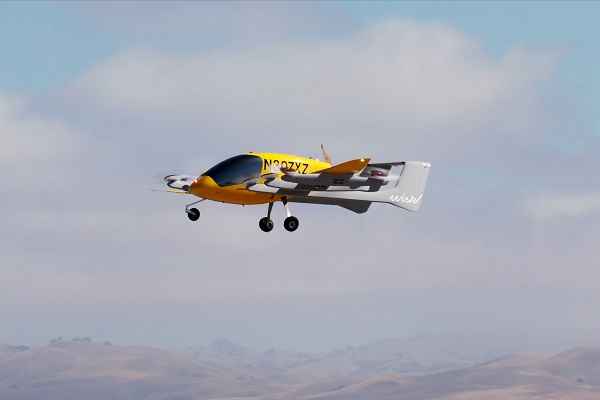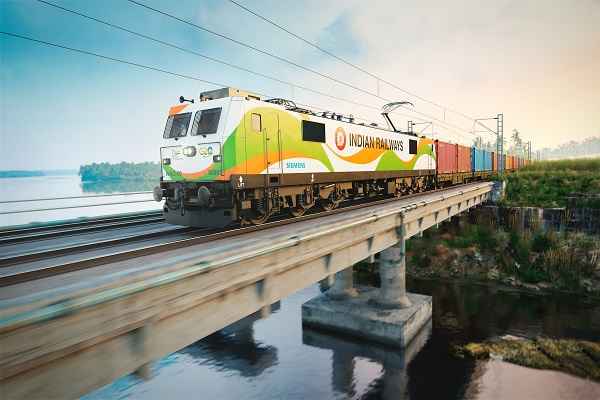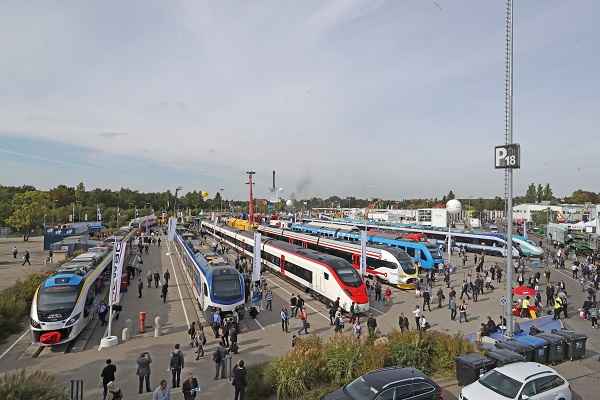 Chalo expands Fleet by 44 percent to meet soaring demand in Mumbai
Chalo expands Fleet by 44 percent to meet soaring demand in Mumbai Japanese Firm Hitachi Eyes Asian Rail Markets in Race with China
Japanese Firm Hitachi Eyes Asian Rail Markets in Race with China Flying Taxis in Chennai: A Glimpse into the Future of Urban Mobility
Flying Taxis in Chennai: A Glimpse into the Future of Urban Mobility No Petrol, Diesel Vehicle Sales in India - Nitin Gadkari, Former Road & Transport Minister
No Petrol, Diesel Vehicle Sales in India - Nitin Gadkari, Former Road & Transport Minister EGIS-SYSTRA JV awarded contract to supervise High Speed Rail Project in Egypt
EGIS-SYSTRA JV awarded contract to supervise High Speed Rail Project in Egypt Navigating India's automotive future with connectivity and location intelligence
Navigating India's automotive future with connectivity and location intelligence GSV signs strategic MoUs with NOKIA, Jacobs and Plasser India
GSV signs strategic MoUs with NOKIA, Jacobs and Plasser India Indian Railways likely to launch first Sleeper Vande Bharat Train on Secunderabad-Pune Route
Indian Railways likely to launch first Sleeper Vande Bharat Train on Secunderabad-Pune Route EMV cards and EMV technology in Public Transport Ticketing
EMV cards and EMV technology in Public Transport Ticketing Hitachi Rail acquires Thales’ Ground Transportation Business for €1.66 Billion
Hitachi Rail acquires Thales’ Ground Transportation Business for €1.66 Billion
Navigating India's automotive future with connectivity and location intelligence

India's automotive industry is marked by significant shifts driven by technology and evolving consumer preferences. Just a few months ago, it was revealed that India held on to the world’s third-largest auto market – ahead of Japan – for the second consecutive year.
The growing automotive market and the rise in population in India present a unique opportunity to leverage connectivity and location intelligence to redefine mobility and enhance the driving experience across the country.
Wired wheels and connectivity
Connected vehicle solutions are gaining traction in India. Major players within the Indian automotive market are collaborating with technology firms to create innovative solutions designed specifically for the Indian market. According to the Automotive Component Manufacturers Association of India (ACMA), almost 90% of new passenger vehicles will have connectivity capabilities and by 2030, 15% of these connected cars will be autonomous. In India, it’s expected that over 60% of vehicles rolling off Indian assembly lines will be connected by 2030.
This trend towards connected mobility is not unique to India; it's a global shift reshaping the automotive landscape across vehicle classes. However, connectivity remains a hurdle in diverse terrains like India, where network coverage can be unreliable. Infrastructure gaps and legacy systems pose barriers to deploying advanced technologies. Bridging these divides demands concerted efforts from stakeholders, underscoring the multifaceted nature of India's automotive industry.
Charging up towards electric mobility and safety
The rapid rise of electric mobility is also contributing to the changing Indian automotive landscape, aligning with ambitious sustainability goals. As part of India’s decarbonization target for 2030, the country’s EV30@30 campaign aims to ensure that electric vehicles (EVs) account for at least 30% of new vehicle sales by 2030. This approach holds tremendous promise for reducing emissions and mitigating the environmental impact of transportation.
At the same time, safety is paramount in the automotive industry, driven by both regulatory demands and consumer expectations. The Ministry of Road Transport and Highways (MoRTH) is looking to make certain Advanced Driver Assistance System (ADAS) features mandatory. Multiple carmakers such as Honda, Hyundai, MG, Tata Motors, and Mahindra have also added ADAS to their premium offerings. This move is a commitment by the Indian government and automakers to enhance road safety.
From EV infrastructure planning to enhancing user experiences through smart, safe navigation and autonomous driving, location intelligence serves as the cornerstone of these automotive advancements.
For instance, the success of EVs hinges on robust infrastructure planning, including strategic infrastructure planning, particularly the optimal placement of charging stations. This is where location intelligence plays a crucial role in facilitating the development of convenient and accessible charging networks nationwide. Location intelligence also helps to improve road safety efforts by providing real-time data insights that inform decision-making and optimise driving experiences.
At the end of the day, location intelligence is not just about making driving more convenient and safe; it's about building ecosystems where vehicles are intelligent, connected and responsive to user needs.
Software-defined vehicles
The concept of software-defined vehicles (SDVs) further represents a paradigm shift. At the heart of SDVs lies the decoupling of hardware and software, reminiscent of the smartphone evolution. This separation enables automakers to deliver new features and functionalities over the air, long after the vehicle has left the showroom floor. The vehicle's lifecycle transcends static hardware, evolving into a continuous engagement through software updates and personalised features.
SDVs are an opportunity for innovative business models, presenting myriad revenue streams where software becomes the core differentiation point for automakers. Beyond traditional vehicle sales, services like subscription-based feature enhancements and data-driven insights into driver behaviour emerge as lucrative avenues.
As the automotive industry gravitates towards automation, SDVs will become as a critical enabler. Vehicles equipped with intelligent software pave the way for autonomous driving functionalities. The integration of location technology spans the spectrum, from precise high-definition (HD) mapping for autonomous navigation to scenario-based simulation for robust testing. This convergence of technologies and mobility will steer India towards a future where self-driving capabilities are not just a distant dream but an imminent reality.
Driving progress together
As India's automotive industry evolves, we’re expecting a future where vehicles are not just means of transportation but dynamic platforms for connectivity, safety and sustainability. For this to happen, it demands collaborative innovation and concerted effort across industries.
We’re already witnessing partnerships with automotive giants like BMW and Mercedes-Benz come to live, where location-powered innovations are bringing tangible benefits, from immersive digital cockpits to automated driving. Vinfast in Vietnam also stands as another testament to HERE’s navigation prowess.
Ultimately, the automotive landscape of tomorrow is not shaped by isolated advancements but by strong partnerships between automakers, technology giants, and location intelligence providers such as HERE. The innovation potential is boundless, with location intelligence serving as the bedrock to usher in an era of smarter, safer, and more enjoyable journeys on the road ahead.
This article is authored by Sockalingam Muthiah, Vice President of Global Customer Success & Technical Support at HERE Technologies.





